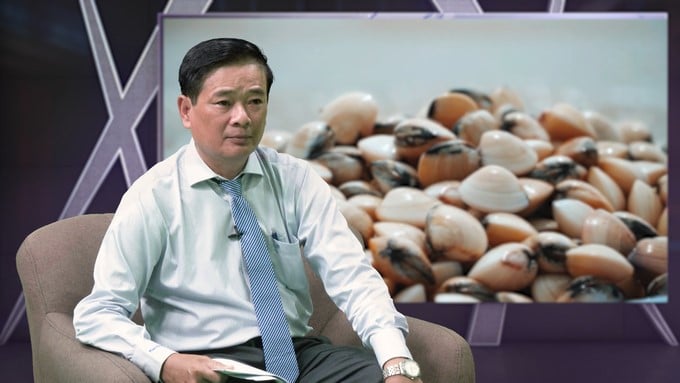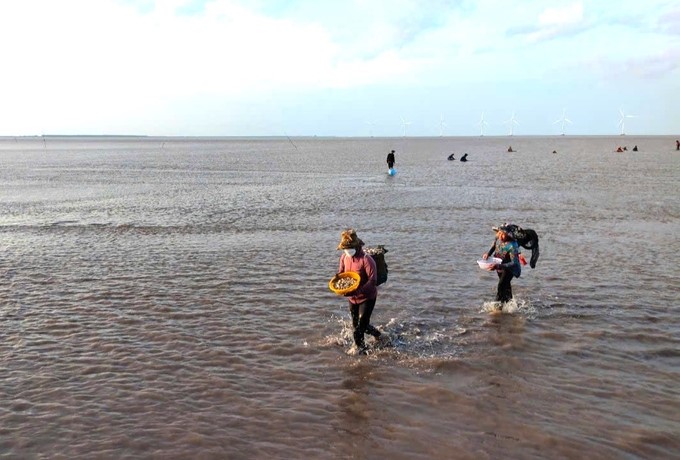November 27, 2025 | 20:52 GMT +7
November 27, 2025 | 20:52 GMT +7
Hotline: 0913.378.918
November 27, 2025 | 20:52 GMT +7
Hotline: 0913.378.918

Mr. Nguyen Van Buoi, Deputy Director of the Ben Tre Department of Agriculture and Rural Development, shared at the talk show on the clam value chain conducted by Vietnam Agriculture Newspaper. Photo: Kim Anh.
Previously, the clam value chain in the Mekong Delta was simply a linkage between producers and consumption units. However, currently, this value chain needs to have more subjects such as input suppliers, producers, product-consuming businesses, policymakers, etc.
In fact, in Ben Tre province, the clam value chain has been formed since 2001 in the form of horizontal and vertical linkages between cooperatives and businesses. However, the value chain is not stable and sustainable.
After decades of building and drawing experience, Mr. Nguyen Van Buoi, Deputy Director of the Ben Tre Department of Agriculture and Rural Development, affirmed that businesses have a very big role, playing a leading role in the industry.
This is proven by the fact that businesses grasp accurate information about the market and promptly forecast annual output, clam size, etc. From there, cooperatives flexibly apply technical solutions to help clams grow quickly, achieve productivity, and supply businesses under export contracts.
In addition, businesses are also the focal point for price forecasting, ensuring stability, so cooperative members will feel secure in production and trust in the operation and management of cooperative leaders.
"Since Ben Tre's clam industry developed according to the value chain of MSC standards, with the participation of businesses, the profits of cooperative members have become increasingly better. People trust and accompany cooperatives in producing and consuming clams," emphasized Mr. Buoi.
Dr. Huynh Van Hien, Head of Faculty of Fisheries Management and Economics, College of Aquaculture and Fisheries (Can Tho University), added that to clearly recognize the necessity of production along the value chain for the clam farming profession, it is essential to review the production method.
Clams are especially sensitive to the environment, so if farming households do not have effective technical solutions, they are susceptible to risks during the production process.

Production and processing techniques are important factors for clams to maintain quality and ensure export requirements. Photo: Kim Anh.
Dr. Hien acknowledged that currently, clam farming cooperatives in Ben Tre province have had an orientation and vision for the profession. People are more responsible in producing, managing, exploiting, and trading clams. The current production trend is "selling what the market needs, not selling what we have," and the clam industry is no exception.
Previously, Dr. Hien participated in a number of research topics on the clam value chain in the Mekong Delta, including Ben Tre province. The expert affirmed that the important issue that needs attention in the chain is quality. The product must have high production and processing techniques. Specifically, clams must not contain sand, or a shipment must not contain dead clams.
MSC certification is considered a great advantage for actors participating in the clam value chain to have the opportunity to increase product value. Through production according to three principles of the MSC evaluation criteria set, including preserving parent clam resources; reasonable exploitation planning; and good protection of existing natural clam seed resources. This is also a requirement to ensure that clam areas are assessed and maintained annually.

The development potential of the clam industry in the Mekong Delta is still very abundant, and there needs to be a comprehensive and fundamental solution to create a source of quality seed to supply to farmers. Photo: Kim Anh.
Currently, the clam industry's export value is about USD 80 million (2023). This is the mollusk product with the largest export turnover. The main markets for Vietnamese clams are Spain and Italy, with the two main products being frozen steamed clams and clam meat. Market demand for these products is now increasing.
In 2009, the entire clam area of Ben Tre province received MSC certification from the Marine Stewardship Council. This is the first fishing industry in Vietnam and Southeast Asia to achieve this certification. 5 years later, Ben Tre continued to receive MSC certification for the second time and was re-certified for the third time in 2024.
The annual output of MSC-certified clams in Ben Tre province reaches an average of 7,500–8,000 tons, with an estimated value of about VND 200–250 billion, thereby creating jobs for thousands of workers.
Translated by Thu Huyen

(VAN) According to Mr. Vo Minh Thanh, Director of the Tay Ninh Department of Agriculture and Environment, Resolution 57 has created a new development pathway for the locality, shifting from traditional toward modern agriculture.
/2025/11/26/4909-2-154329_878.jpg)
(VAN) Pearl grouper farming in HDPE cages not only delivers economic efficiency but also contributes to protecting the environment, creating jobs, and promoting marine-based experiential tourism.

(VAN) The model of making a living under the forest canopy through the agroforestry system in Van Son commune, Bac Ninh province, is expected to generate an annual income of approximately VND 30 million/ha.

(VAN) Many enterprises in Can Tho are harnessing natural energy and reducing greenhouse gas emissions in their production processes, thereby contributing to the promotion of a sustainable green transition.
/2025/11/24/3536-2-112800_176.jpg)
(VAN) Dong Nai now has tens of thousands of hectares of forests certified for sustainable management, and this area will continue to be expanded in the coming period.

(VAN) Vinh Ha hamlet (Dai Xuyen commune, Hanoi) is shifting away from small-scale farming as households adopt bioscurity into their breeder chicken models.

(VAN) Heavy rains make aquatic species more vulnerable to disease. Proactive water management and high-tech systems help farmers prevent outbreaks and protect yields.